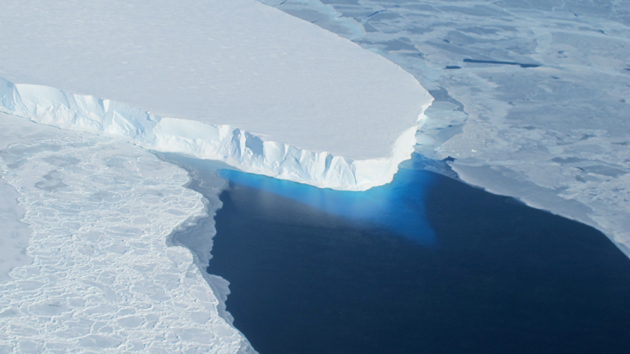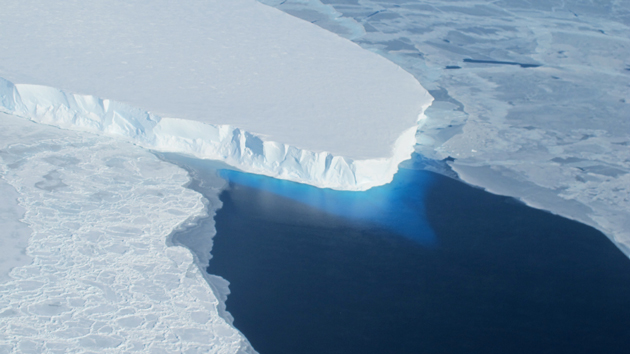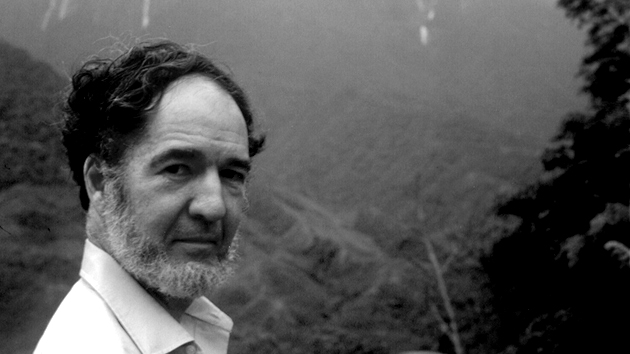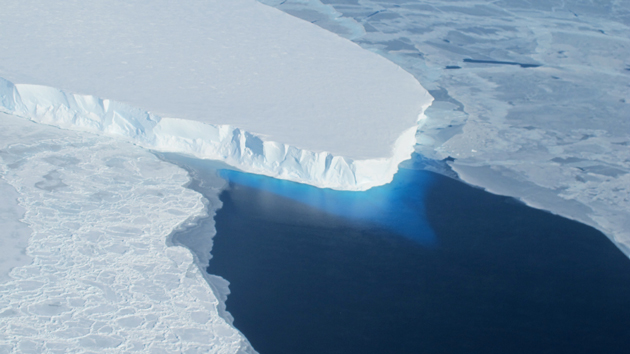
The Thwaites Glacier of West Antarctica. In a new sci-fi novella, the collapse of this ice sheet becomes synonymous with the collapse of Western Civilization.<a href="http://www.nasa.gov/jpl/earth/antarctica-telecon20140512/#.U3ExeWSG25g">NASA</a>
You don’t know it yet. There’s no way that you could. But 400 years from now, a historian will write that the time in which you’re now living is the “Penumbral Age” of human history—meaning, the period when a dark shadow began to fall over us all. You’re living at the start of a new dark age, a new counter-Enlightenment. Why? Because too many of us living today, in the years just after the turn of the millennium, deny the science of climate change.
Such is the premise of a thought-provoking new work of “science-based fiction” by Naomi Oreskes and Erik Conway, two historians of science (Oreskes at Harvard, Conway at Caltech) best known for their classic 2010 book, Merchants of Doubt: How a Handful of Scientists Obscured the Truth on Issues from Tobacco Smoke to Global Warming. In a surprising move, they have now followed up that expose of the roots of modern science denialism with a work of “cli-fi,” or climate science fiction, entitled The Collapse of Western Civilization: A View from the Future. [SPOILER ALERT: Much of the plot of this book will be revealed below!] In it, Oreskes and Conway write from the perspective of a historian, living in China (the country that fared the best in facing the ravages of climate change) in the year 2393. The historian seeks to analyze the biggest paradox imaginable: Why humans who saw the climate disaster coming, who were thoroughly and repeatedly warned, did nothing about it.
So why did two historians turn to sci-fi? On the latest installment of the Inquiring Minds podcast, Oreskes explained that after the extensive research that went into Merchants of Doubt, she and Conway “felt like we really understood the science, but we also felt that the scientific community had really not explained why any of this mattered. And we just kept coming back to this idea of, how do we really talk about why this matters, and not just for polar bears, and not just for people living in far flung places or far into the future, but what’s really at stake.”
The resulting book, The Collapse of Western Civilization, diverges in many respects from other cli-fi works, such as the novels of Kim Stanley Robinson (who clearly influenced Oreskes and Conway, and who blurbed their new book). Collapse is quite short, and hardly a study in character or plot. It has one narrator, and that narrator is a “scholar,” approaching the topic analytically. The force of the story, then, comes not so much from dramatic elements, but rather, from its simple conceit: How would a fair-minded thinker, living 400 years from now, evaluate us?
The answer couldn’t be more depressing: We got it all wrong. We sacrificed our birthright. We unleashed ravaging heat waves, destabilized ice sheets, shot chemicals into the skies in a failed attempt to fix our mess, then halted that intervention and made everything still worse. (All of these things unfold in the story.)
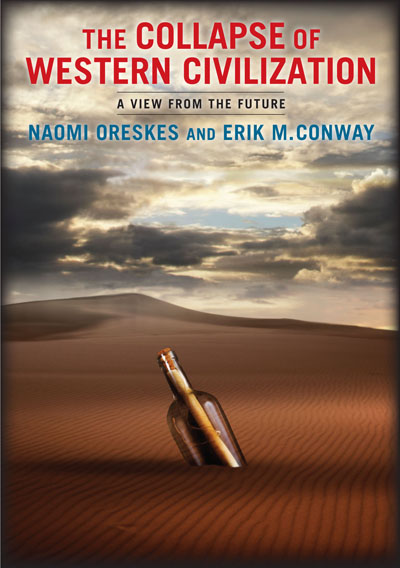
The consequences were toppled governments, mass migrations, and unimaginable human tragedy from starvation, dehydration, and disease. Finally came the “collapse” itself, not of Western Civilization at first, but of the West Antarctic Ice Sheet, which in the late 21st century rapidly disintegrated, driving up sea levels some 5 meters. Much of Greenland soon followed.
“We were trying to sort of play on this two different senses of ‘collapse,'” explained Oreskes on Inquiring Minds. Summarizing the plot of the book, she elaborated as follows: “The West Antarctic Ice Sheet does collapse, causing massive rapid sea level rise, which then puts into effect a kind of chain of events, which ultimately leads to the collapse of political and cultural institutions as well.”
This is a worst-case scenario, but it is far from crazy in light of our current trajectory. And we are on this trajectory because we’re ignoring the evidence all around us. “A shadow of ignorance and denial had fallen over people who considered themselves children of the Enlightenment,” writes Oreskes’ and Conway’s historian, explaining why our present era will later be called the “Period of the Penumbra.”
So why are we currently on course to be remembered for causing humanity’s greatest failure? The historian singles out two causes in particular, the first of which may be surprising.
First off, the historian argues that our scientists failed us, and in a very particular way: They failed us by being too conservative. Scientists today know full well that the “95 percent confidence limit” (the requirement to statistically establish that there is less than a 1-in-20 chance that a given scientific result is due to chance—or, a 19 in 20 chance that it is real—before it can be accepted) is merely a convention, not a law of the universe. Nonetheless, this convention, the historian suggests, led scientists to be far too cautious, far too easily disrupted by the doubt-mongering of denialists, and far too unwilling to shout from the rooftops what they all knew was happening.
“We have come to understand the 95 percent confidence limit as a social convention rooted in scientists’ desire to demonstrate their disciplinary severity,” writes the historian. “Western scientists built an intellectual culture based on the premise that it was worse to fool oneself into believing in something that did not exist than not to believe in something that did.” The historian even cites the currently live issue of the relationship between hurricanes and global warming: It is very likely that global warming is changing these storms in some way, but showing that in a way that satisfies all of the relevant experts has proven very difficult.
Why target scientists in particular in this book? Simply because a distant future historian would too, says Oreskes. “If you think about historians who write about the collapse of the Roman Empire, or the collapse of the Mayans or the Incans, it’s always about trying to understand all of the factors that contributed,” she says. “So we felt that we had to say something about scientists.”
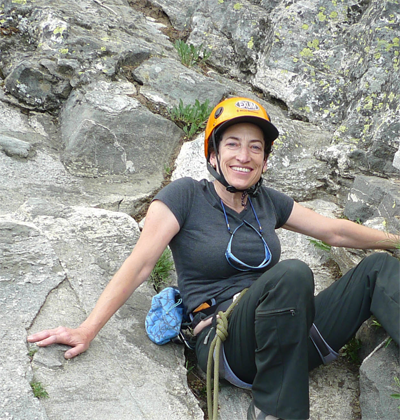
And then, there are the ideologues. They are, of course, vastly more culpable than the scientists. Here, The Collapse of Western Civilization picks up a theme from Merchants of Doubt: Free market ideologues, trained on the idea that the Soviet Union was the root of all evil, converted to an economic religion of their own dubbed “neoliberalism,” defined as “the idea that free market systems were the only economic systems that did not threaten individual liberty.” Unfortunately for this worldview, market failures do exist, and climate change is the granddaddy of them all. But too many neoliberal ideologues couldn’t accept that, so they doubled down on fantasy. (These are the climate change denying libertarians that we all know so well.)
In The Collapse of Western Civilization, neoliberals receive a comeuppance for this that is appropriate in its dramatic irony. The book ends by noting that China, a country not exactly wedded to freedom of thought or free markets, nevertheless survived climate calamity the best, thanks to its ability to exercise the centralized power of the state to force rapid climate adaptation. Eighty percent of Chinese thus survived the climate cataclysm. Other nations soon followed suit, also growing more autocratic.
Oreskes is not applauding this, of course; rather, she’s suggesting that it could be a very, very painful irony resulting from the behavior of neoliberals. “It could well be the case that the authoritarian nations are actually better situated to deal with climate disruption than the liberal democracies,” says Oreskes. “And we want to suggest that that’s a very worrisome thought.”
So can we still prevent ourselves from writing the story of The Collapse of Western Civilization—a story in which the historian narrator repeatedly points out missed opportunities, when something could have been done to prevent the disaster that followed? Oreskes thinks the answer is yes.
“It’s not too late. We do still have opportunities,” she says. “But if we continue the way we’ve been going, and we continue to miss these opportunities, there is going to become a point of no return.”
This episode of Inquiring Minds, a podcast hosted by neuroscientist and musician Indre Viskontas and best-selling author Chris Mooney, also features a discussion of questionable claims about “drinkable” sunscreen, and a new study finding that less than 1 percent of scientists are responsible for a huge bulk of the most influential research.
To catch future shows right when they are released, subscribe to Inquiring Minds via iTunes or RSS. We are also available on Stitcher and on Swell. You can follow the show on Twitter at @inquiringshow and like us on Facebook. Inquiring Minds was also recently singled out as one of the “Best of 2013” on iTunes—you can learn more here.
